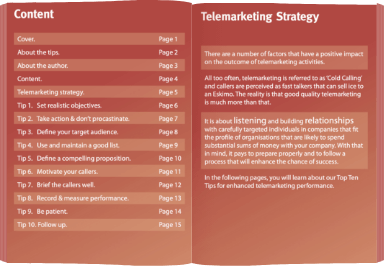It puzzles me to work out why telemarketers fail so often. Reading this, some may feel it’s because cold calling is dead. No one responds to a cold call anymore. But, before we enter that debate, we should consider first what success actually means. If I make 1000 calls at a cost of £2000, for example, and I deliver a client that generates a one-off £2500 that just happens to mean break-even on the exercise, is that failure. Or, is zero new clients the measure of failure?
Measuring success
What’s more, should we measure success over 100, 1000 or 10,000 calls? And, over what timeframe? Of course, that depends on so many factors. The complexity and value of sale comes into this determination. The typical gestation period plays a role. There are lots of factors that enhance or impede success and that determine the likely ROI payback period.
ROI
Like with any methods of marketing, we need to work out what the likely ROI is going to be. Until we have a valid benchmark, that’s often difficult. Hence, we need to test and measure to establish the parameters for success. But, how do we ensure that any test is valid in the first place? That’s where good data and a clear proposition come in. Equally, you need to define your target audience as tightly as possible to decrease wastage.
Telemarketing basics
You’d possibly anticipate here that we are about to talk about the telemarketer. But, the basics are really accurate data on the right job roles with individuals that are still in their job. Sounds obvious. But b2b data for marketing is notoriously inaccurate. Hence, data building is essential. Once you have the right person, you need to work out what floats their boat. And, don’t forget that it needs to be compelling since most buyers already have something similar to what you offer.
Once you have a good database and a clear proposition, why is it that so many telemarketers still fail to hit the mark? In our experience, it comes down to the following, given the above.
-
- They simply fail to make enough calls. I recently ran a training course for a company where the quality of the callers was high. The calls to decision maker ratio was strong. And, the proposition was clearly defined. They were calling into the healthcare sector which is quite a tough nut to crack but, once again, the engagement rate was good. The simple fact was that the call rate was far too low. Hence, they were setting themselves up for failure. More calls equals more conversations. More conversations means more leads.
- The intro fails to hit the spot. Often, we hear introductions that are product or service centric. They start with a pitch or a long list of features. It kicks off with a monologue about what the company offers. Telemarketers need to realise that the customer doesn’t care. They need to quickly believe you’re credible, that you care, that you understand and that there is merit to staying on the line. So, switch around your telemarketing introduction and your opening line and you’ll be more successful.
- The tempo and tone is all wrong – an approach akin to a machine gun is going to fail. The pace should be even. The tone should be upbeat without being overbearing. If you can’t sound excited by what you do and what you offer, why should the prospect respond? So, make sure you work on your pace and tone. Get colleagues to give you feedback. Record yourself and ask yourself whether you’d buy from you. If you get your tone and pace right, you’ll be on the right track.
- They fail to get past the gatekeeper – now this isn’t easy. Many gatekeepers are professional blockers. However, the start point here is point 1 above. Not every company has hard-nosed Rottweiler guard dogs. Make enough calls and you’ll get through more often. But, it’s also about techniques. Don’t engage if you don’t have to. Be purposeful, assertive and concise and you’ll reach more decision makers. Getting past the gatekeeper is essential if you want to reach your lead generation targets. So, devote some time to working on gatekeeper techniques.
- They panic in front of senior decision makers – this isn’t uncommon. But, what telemarketers need to remember is that the buyer is human, if you have something they need, that’s good news and if you can genuinely support them to do better, look better and make more money that’s a win: win. This is where preparation comes in. Know your buyers and their needs. Take the time to brief yourself well. Keep things simple. You need to be clear about your objective and why they should talk to you. You need to boil it down to one or two sentences at the outset. And, remember that, once again, enough calls will mean enough leads, especially with the correct approach.
- They use stiff, stilted language – why is it when telemarketers finally reach a decision maker, they go all weird and start using words they would never use in a normal conversation. This is a conversation like any other. Treat the buyer as an equal. Don’t defer. Don’t over-illiterate. Once again, keep it simple and talk in their language, using their words ideally.
- They fail to pick up on cues – a busy buyer will be a busy buyer whether you have something of interest or not. Too many callers ignore the basics. From the moment a buyer comes on the line, a good callers feels the pulse. I have often said to a prospect within seconds of the start of a call that it sounds like they’re super busy and isn’t the right time. I’m looking for approval to go on. If not, I want their approval to call back. Likewise, very early on, you can sense whether you’re hitting the spot or not. There’s no point banging your head. Stop and ask.
- They fail to ask the right questions – why do telemarketers talk and talk and pitch and fail to ask questions? And, when they do they ask the most banal questions such as “is that of interest?” It’s no wonder that it isn’t. Make questions a key part of your call. Establish rapport at the outset with a good intro and credibility statement. But, then pause and ask a good open question that hits at the heart of why they might use your products and serviced if you sense that you have built rapport.
- They just don’t stop talking – we all love to talk. I love to talk. But, and it’s important, on a prospect call I talk about the customer and their issues and I ask lots of open questions which forces me to stop and encourages them to talk. Do you like sitting passively just listening for several minutes when you have 100 tasks on your desk, a customer screaming at you and your boss demanding the outcome of a task he or she gave you last week? No? Well, nor does a buyer. You need to make the call worth their while. And, talking at them all the time just won’t cut it.
- They don’t qualify – like buyers, sales people don’t want to waste their time. So, shoehorning a buyer into a meeting that’s Ill-qualified is bad news for all. It’s worse that no meeting. A fully criteria based and qualified meeting is worth its weight in gold. And, in the process, through asking the right profiling questions, you’ll have more conversations and generate more leads.
Of course, the above aren’t the only reasons that telemarketers fail. They may fail to overcome objections. They may not have prepared sufficiently for the call and done their research. It may be that the data is genuinely awful. But, even with good data, telemarketers won’t achieve positive outcomes if they don’t do the basics right.
If you’d like training on successful telemarketing or you’d like to run an effective telemarketing campaign, give GSA a call.






